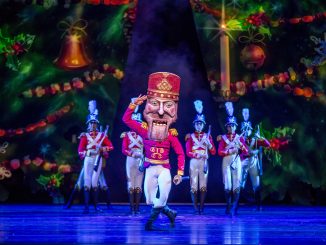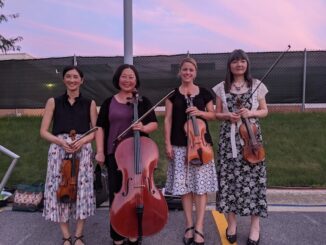
In commemoration of the 100th anniversary of Polish Independence and Armistice Day, from November 7-11, 2018, The Chicago Philharmonic presented Chicago Philharmonic Festival: Poland 2018 at various venues in Chicago intrinsically meaningful to its large, colorful, historically significant Polish population. Poland gained independence after more than a century of division among foreign powers on Nov. 11, 1918, now celebrated as Veteran’s Day in America, the day that World War I ended.
This reviewer was fortunate to attend 2 of these events; the music presented was powerfully different, but the energy, cordiality and graciousness of the Polish people hosting/participating were identical. Thanks to all the hard work of all the persons in the organizations that put together this stunning series of events; special kudos to Donna Milanovich, Executive Director and Scott Speck, Artistic Director, Chicago Philharmonic, for their tireless efforts and musical vision.

On November 9th, at Polish Museum of America, 984 N Milwaukee Avenue, Chicago, “Pianohooligan” Piotr Orzechowski, composer and jazz pianist, performed pieces from his 24 Preludes and Improvisations, 2017, a Chicago premiere introduced by Richard Owsiany, President of the museum. The performer was intent, intensely involved with every nuance of his work, faintly reminiscent of Keith Jarrett. Sometimes atonal, sometimes percussive, always beautifully played, the complex melodies were striking, the virtuoso talent undeniable.
The pieces, musical miniatures, allude to Johann Sebastian Bach’s 24 Preludes and Fugues, interspersed with improvisations set to the chromatic scale, and hearing them, it has been written, “allows Orzechowski’s extraordinary talents and passion to wow the audience with the phenomenon of jazz.” After the brilliant concert, and the young artist had been presented with roses, guests were treated to a lavish buffet of traditional Polish food in a warm demonstration of camaraderie.

On November 11th, 2018, at St. Hyacinth Basilica, 3636 W Wolfram Street, Chicago, Chicago Philharmonic with members of Paderewski Symphony Chorus featuring Marek Moś conductor, Natalia Rubiś soprano, Katarzyna Sądej mezzo-soprano, Jesse Donner tenor, Kurt Link bass, and Andrzej Białko organ, performed Wojcech Kilar’s Mass for Peace, 2001, in an appropriate liturgical setting.
After an introduction and welcome by Piotr Janicki, Consul General of The Republic of Poland in Chicago, the 1st piece performed was Krzystof Penderecki’s newly composed world premiere, Fanfara, the most recent fanfare composed by the renowned Penderecki.
Poland’s largest music publisher, PWM, commemorated the centennial of the country’s independence by hosting 11 concerts in 11 cities outside Poland- a number chosen to represent the Nov. 11 Independence Day- highlighting the work of modern Polish composers. The shows- in London, Melbourne, New York, Chicago, etc.- featured music written in the past 100 years by Polish composers such as Henryk Mikolaj Gorecki, Wojciech Kilar, Krzysztof Penderecki and Karol Szymanowski. Eleven concerts were also set for Sunday, November 11th in Poland. Altogether, 100 Polish compositions will have been played, each concert beginning with the one-minute Fanfare for the Independent Poland, Penderecki’s new composition for wind instruments, timpani and percussion, written for the anniversary.

Immediately after the exquisite Fanfare, came the glorious modern Mass for Peace, by legendary Polish Composer Wojciech Kilar, whose work has been enjoyed by popular audiences for over half a century. The Missa Pro Pace, performed this day in the midst of a reverential and most moving mass conducted in Polish, Latin and English, in this stunning church filled with gilding, stained glass, and frescoes, consisted of members of Chicago Philharmonic and Paderewski Symphony Chorus, mixed choir, organ, and a quartet of soloists.
Composed to commemorate the 100th anniversary of the Polish National Philharmonic, the Missa Pro Pace refers constantly to traditional templates in an effort to express the sacred presence of The Almighty. Coupled with the glorious individual voices, the fine musicians, firmly and expressively led by Maestro Moś, sent the soaring, ceremonious music throughout the whole enormous, packed edifice, providing a perfect setting for the religious rite itself.
The piece is characterized by simplicity formed by choral monady, raw polyphony, and diatonicity, and ascetism, in that the instrumental composition is “scarce”, and creates an air of meditation, contemplation- in sum, a prayer-like atmosphere. The musicians captured this feeling, with a solemn yet spirited sense of time, place and peace.

For information and tickets to all the great programming of The Chicago Philharmonic, go to chicagophilharmonic website
All photos by Elliot Mandel




Be the first to comment